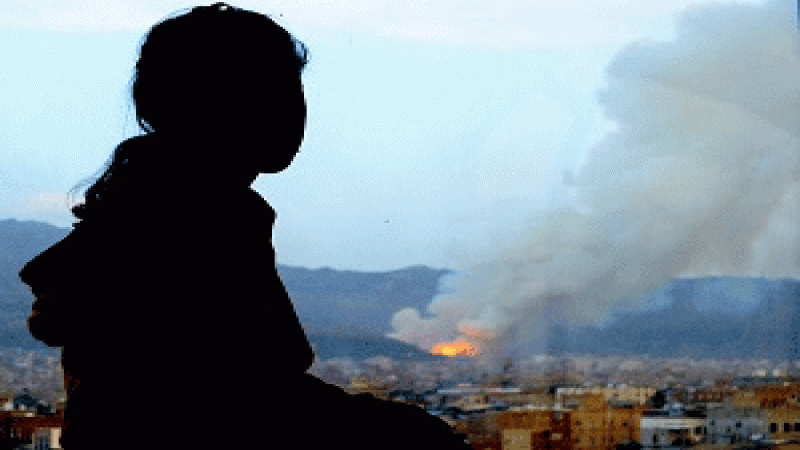
By Karen McVeigh
The British government should increase diplomatic efforts with Saudi Arabia to defend children facing a desperate situation in Yemen, the head of Save the Children has said.
Speaking on his return from Yemen, where civil war and a sea blockade has pushed the country to the brink of famine, Kevin Watkins said there had been a “singular failure to deploy British soft power to defend children’s rights that are being violated on a daily basis”.
The conflict in Yemen has claimed at least 10,0000 lives, according to the UN. The organization has urged a resolution to the conflict, which has created one of the world’s biggest humanitarian emergencies yet gone largely ignored by the international community.
Watkins, Save the Children’s chief executive, said he came across districts in which 40% of children were acutely malnourished, double the proportion recognized by the World Health Organization (WHO) as a food emergency. He said the time had come to “turn up the volume” on British efforts with the Saudis.
“The Saudis are utilizing British aerospace systems, they have been granted licences for £3bn of military equipment. They are a major UK ally and yet there has been a singular failure to deploy British soft power in defence of children’s rights that are being violated on a daily basis.
“While the UK has been effecting some quiet diplomacy which has made a difference, the time has come to turn up the volume on diplomacy and make it clear that countries that indiscriminately bomb schools, conduct humanitarian blockages and deprive children of life-saving food and medicine – that these are operating outside the values guarding the UK’s foreign policy.”
A Foreign Office statement acknowledged the significant impact the Yemen conflict has had on children in terms of casualties, recruitment of child soldiers and attacks on hospitals and schools.
“Through UK aid to Yemen, last year we helped treat over 150,000 children under five for severe acute malnutrition and screen 140,000 children for childhood infections,” said the statement. “We also helped support and refer displaced children and enabled 3,500 refugee children and Yemeni children from their host communities to resume education. We continue to urge all parties to the conflict to take all reasonable steps to allow and facilitate rapid and safe humanitarian access, and to take all feasible precautions to avoid harming civilians and civilian infrastructure.”
Former international development secretary Andrew Mitchell last week criticized the UK for a “confused and inconsistent” policy towards the Saudi-led coalition in Yemen, with arms sold and aid given at the same time.
Earlier this year, human rights groups condemned a decision by the UN to remove Saudi Arabia from a blacklist of countries accused of violating children’s rights, after the Saudi’s campaign against the Houthi rebels was blamed for causing 60% of child deaths in Yemen.
Watkins spent a week visiting hospitals in Sana’a and Amran, as well as health facilities run by the charity across the country. He said he encountered failing hospitals and schools destroyed by bombs: “It’s difficult to capture in words how bad the situation is. We’ve done street programs for 75,000 children. We are picking up acute malnutrition levels of about 40% in some districts.”
The WHO classification for a “critical” nutrition emergency is 15%. About 3.3 million children and pregnant or breastfeeding women are acutely malnourished in Yemen, including 462,000 children under five suffering from severe acute malnutrition, according to the latest report from the UN Office for the Coordination of Humanitarian Affairs.
Yemen, which has a population of about 24 million, is one of four countries on the “areas of highest concern” list for famine in 2017, according to the Famine Early Warning System. Improved humanitarian access and trade support is needed to limit the famine risk for Yemen, the US-based agency concluded in January this year.
Watkins said the plight of the country’s children had been exacerbated by a “de facto humanitarian blockade” by the Saudis.
“What you see are kids with kwashiorkor [a severe form of malnutrition], with distended bellies and misshapen heads.
“These are kids in an absolute desperate situation. I visited hospitals with intensive care units for young babies, where there is inconsistent electricity, where incubators are broken and where trained staff are unavailable because they haven’t been paid for four months.
“This has been exacerbated by what is de facto a humanitarian blockade from the Saudis, which incidentally is a war crime. It is exacerbated by high levels of bombing. It is being exacerbated by the economic collapse, which is also due to the conflict.”
Watkins also visited a girls secondary school in a residential area in Sana’a, which had been partially destroyed by bombing, he said.
“This is a country with one of the biggest gender gaps in education in the world. This is destroying the educational infrastructure in a country with deep need for education for girls and for young people in general.”
The war has devastated the country, already the Arab world’s poorest. UN officials estimated that nearly 19 million people are in need of humanitarian aid. More than 3 million people have been displaced.
The sea blockade and airstrikes, which have hit civilian targets including hospitals, are part of a campaign to push rebels out of the capital.
There have been widespread calls for an independent inquiry into the conflict, including from senior British MPs.
However, in November, the British government rejected the recommendation of two select committees to suspend arms sales to Saudi Arabia. It concluded there is no clear risk of serious Saudi breaches of international humanitarian law in Yemen, even although it admitted UK defence personnel lack information and cannot “form a complete understanding” of the Saudi led forces to such laws. More than a third of Saudi-led bombing raids are thought to have hit civilian sites….
Source: The Guardian, Edited by Website Team